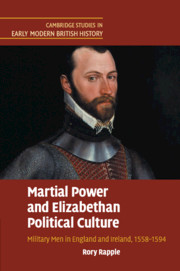Book contents
- Frontmatter
- Contents
- Acknowledgements
- List of abbreviations
- Notes on the text
- Political map of sixteenth-century Ireland circa 1534
- CAMBRIDGE STUDIES IN EARLY MODERN BRITISH HISTORY
- Introduction
- 1 Chimneys in summer
- 2 Martial men and their discontents
- 3 The limits of allegiance: English martial men, Europe and the Elizabethan regime
- 4 The captains and the Irish context
- 5 The limits of imperium: martial men and government
- 6 The limits of rhetoric: the captains and violence in Elizabethan Ireland to 1588
- 7 Unlimited indemnity: delegates versus viceroys
- Conclusion
- Bibliography
- Index
Conclusion
Published online by Cambridge University Press: 02 July 2009
- Frontmatter
- Contents
- Acknowledgements
- List of abbreviations
- Notes on the text
- Political map of sixteenth-century Ireland circa 1534
- CAMBRIDGE STUDIES IN EARLY MODERN BRITISH HISTORY
- Introduction
- 1 Chimneys in summer
- 2 Martial men and their discontents
- 3 The limits of allegiance: English martial men, Europe and the Elizabethan regime
- 4 The captains and the Irish context
- 5 The limits of imperium: martial men and government
- 6 The limits of rhetoric: the captains and violence in Elizabethan Ireland to 1588
- 7 Unlimited indemnity: delegates versus viceroys
- Conclusion
- Bibliography
- Index
Summary
In so many ways, Elizabeth's constables, seneschals and presidents seemed merely to aspire after the pattern of life which had been enjoyed by fifteenth- and sixteenth-century landed gentry back home in England. In short, they sought to be lords of land and men, to attain the standing and dignity that so many of them had not been able to achieve in England because of the untimely death of their parents, the sequence in which they had been born or some other misfortune. Despite David Trim's argument that the martial officers of Elizabethan England prioritised the ‘fighting [of] Jacob's wars’ (the smiting of the enemies of reformed religion) above all else, each of these men were never more like Jacob than when struggling against the legacy of their own Esaus – their older brother entitled to everything – carving out their own patrimony by fair means or foul. Like their exemplars in Kent, Lincolnshire and Somerset, these men on their arrival in Ireland not only acquired manors but sought through the use of ad-hoc commissions to implement law and order through judicial procedure in the monarch's name. Resembling the gentry of the 1450s Boke of Noblesse, Ireland's English-born seneschals, constables and provincial presidents each took pride in being ‘a captain or a ruler at a session or a shire day’. According to their own stated credo, their presence prevented the country, already riven by forcible entry and theft from degenerating further into faction and crime.
- Type
- Chapter
- Information
- Martial Power and Elizabethan Political CultureMilitary Men in England and Ireland, 1558–1594, pp. 301 - 308Publisher: Cambridge University PressPrint publication year: 2009

